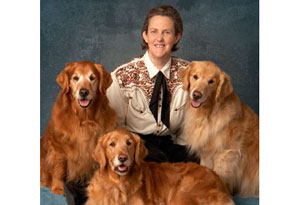5 Things Temple Grandin Knows for Sure

Claire Danes stars in Temple Grandin Feb. 6 on HBO.
In her best-selling books, Temple Grandin, a renowned designer of humane livestock facilities, has explored the inner worlds of people with autism (she is herself autistic) and advocated for animal welfare. The invigorating new HBO biopic Temple Grandin chronicles the heartbreaks and breakthroughs of Grandin's teens and 20s—including a life-changing stay at her aunt's Arizona ranch, where she first encountered the horses and cattle that inspired her work. Here, Grandin, now 62 and a professor at Colorado State University, talks about facing fear, admitting mistakes, and the upside of autism.
1. The autistic mind is constantly learning. I have an Internet inside my brain, and the more experiences and memories I have, the more web pages I have to search. That's why it's so crucial to expose autistic kids to lots of interesting things, even if they're afraid. I was so scared to go to my aunt's ranch when I was 15, but it was the best thing that ever happened to me.2. A little autistic fixation can be helpful. When I started my career in the early '70s, no women worked in the cattle yards. The guys didn't like me being there, but I didn't pick up on the subtle social cues; what I cared about was working with the animals and studying the cattle chutes. Being autistic was an advantage, because all the hostility didn't affect me as much.
3. Engineering is easy— it's the people problems that are hard. It took a long time for me to puzzle out that an engineer could break his own company's equipment or sabotage a project because an outsider—me—had invaded his turf. Now I know that you just need to pull 'em into the project, give 'em a piece of the action.
4. When in doubt, eat the whole crow. Long ago, I made mistakes on the designs for a project I was working on; it was half my fault, half the plant's fault. I walked into the boss's office and took all the blame—I ate the whole crow, because I knew it would save the project. My attitude is: "I did something wrong. Suck it up so we can move on."
5. Animals taught me the meaning of life. In my work, you look mortality in the face. At the slaughter plants, I was there when the cattle died, and I felt so deeply that we had to give them a decent life and a painless death. But I also thought, "When it gets to be my time, will I have accomplished something of ultimate value?" That's how I define my life's purpose.

The real-life Grandin with some furry friends.
More Must-Watch TV: A recap to get you ready for the final season of Lost
Photos: Courtesy of HBO; Joel W. Benjamin



